
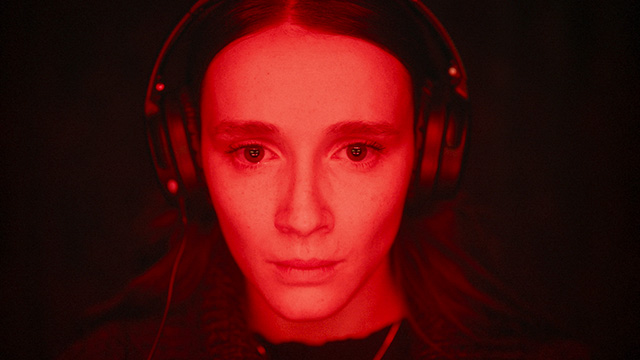
Friday August 23, 2024 | Movie Reviews | Neal
RED ROOMS
A Review by Aaron Barrocas
---Mild Spoilers---
"Red Rooms"
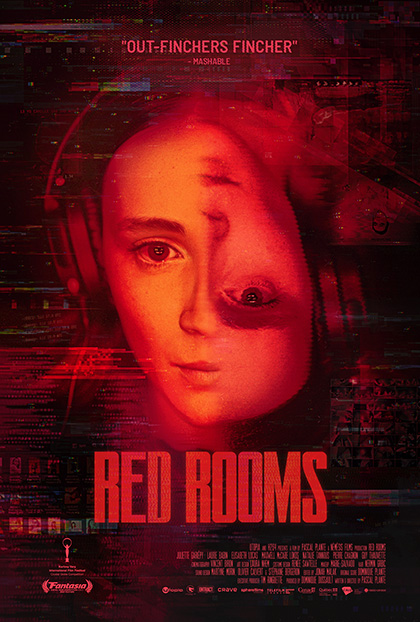
A personal note before a further discussion of this film - this movie takes place in, and prominently features, the city of Montreal. As a non-French speaker, my experience is limited to the subtitled version, and in a movie as artfully and painstakingly crafted as Red Rooms, I am certain to have missed some nuance in the translation. This is only to my own detriment, and I will without hesitation recommend that you watch the movie yourself, and everything below is in support of that statement.
Red Rooms is a dark, jarring psychological thriller set against the backdrop of a criminal trial. 39-year-old Ludovic Chevalier is accused of torturing and murdering three teenage girls, and broadcasting his crimes on the dark web for profit. His trial has generated media attention and controversy.
We meet our protagonist - if she is that. Kelly-Anne is played by Juliette Gariépy. Director Pascal Plante knew that we needed to fully believe in the reality and humanity of this character in order to invest ourselves in the story, and we do. Her natural, entirely convincing performance is supported by Plante’s confident directing that at no point felt the need to pander, explain, or simplify.
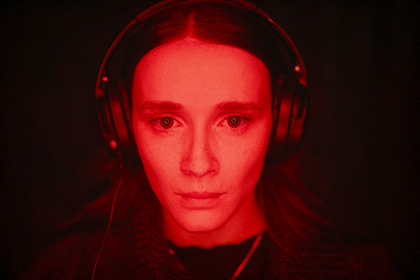
Kelly-Anne is attending Chevalier’s criminal trial - not as an involved party, but as a spectator. Why? We don’t know. We are investigators from the opening scene - tasked with pulling clues from the information provided as to who Kelly-Anne is, and why she is doing each and every mystifying thing that she does.
As we dive into this story about the dark web, we are brought into a world of dark themes, dark personalities, and often literal darkness. Kelly-Anne is a financial success. As a model, she is featured on magazine covers and in ads. She plays online poker, and wins frequently. She claims that money is just numbers inside a computer, and that she is “not bad” with numbers. And every morning she waits at the courthouse door for admission to the ugliest trial imaginable.
Kelly-Anne befriends another spectator - a woman named Clementine, played by Laurie Babin. Clementine fervently believes in Chevalier’s innocence. She proclaims this belief loudly to the press and anybody else who will listen - along with poorly considered theories to explain away a mountain of damning evidence. Clementine has never met Chevalier, and yet she seems to be in love with him.
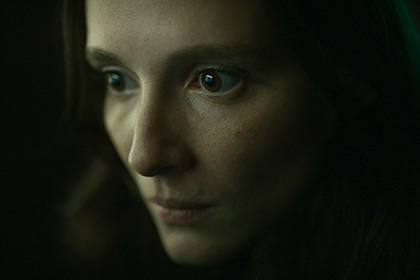
Babin’s Clementine is a sympathetic - if not quite relatable - character, despite her flat-earth-like belief in Chevalier. Babin embraces a character who would be easy to belittle or condescend to - especially in current times, when people who readily believe false narratives are frustratingly common. At one point, we see her mocked by others, and we suffer the insults on her behalf. It takes a deep understanding of humanity to find the hurting soul behind this cultishly smitten individual, and share enough of that with an audience that we feel all the slings and arrows that she invited with her own poor judgment. Clementine is crucial to the themes in the film, and had Babin not done the role such graceful justice, the movie would have suffered.
The cast is rounded out by Elisabeth Locas as Francine Beaulieu, the grieving mother of a child taken too soon. She is a constant reminder of the humanity involved, and her pained presence is the strongest contrast to Chevalier himself. Maxwell McCabe-Lokos, playing Ludovic Chevalier, could easily have been an actual murderer that Pascal Plante placed in a box on the set. His guilt and his fate are to be determined, but his demeanor is horrifying. It would be interesting to see him have a larger role in the film, as his physicality alone is seething with an aura of sociopathy and violence, but we’ve already seen the film about him - whether he is innocent or guilty - we’ve watched that movie, and a few times. But this film - Kelly-Anne’s movie - is rather different.
Aside from their shared interest in the trial, Kelly-Anne and Clementine couldn’t be more opposite. Clementine is practically homeless, and barely has money to feed herself. She stays in shelters. Kelly-Anne enjoys luxury and all its trappings - an expression that is almost literal in this case, as Kelly-Anne is more comfortable sleeping on a ledge in an alley near the courthouse than in her gorgeous high-rise apartment.
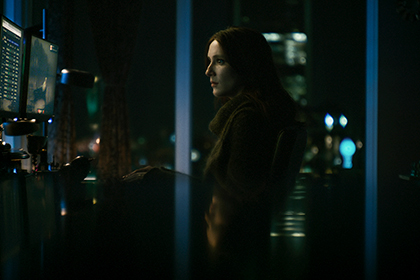
Red Rooms is filled with frequent rapid-fire exposition – and while that term often suggests problematic writing or lazy storytelling, it is the opposite in this case. Rather, the method in which the story is delivered is brilliant, as Kelly-Anne spends much of her time alone, so we must rely on information from attorneys and witnesses in court, journalists - both on television and in-person, emails read aloud by a virtual assistant, voicemail messages, and much less frequently, actual conversations. All of these sources exist not only to help us understand the story, but more importantly, to help us understand Kelly-Anne. We see the world from her perspective - and the experience of viewing this film, where answers are not readily available, and information is provided in some cases intentionally free of clear context, is close to that of reading a novel - and it is as satisfying. The film is a very suspenseful mystery that never truly stops unfolding. We are taken on a frightening emotional journey with Kelly-Anne, without fully understanding why the journey exists at all, until we do.
This is a rare film that is able to perfectly weave a moment that you will feel viscerally as you watch, and will remember for years. The reveal of Norman Bates in the wig in Psycho. The home video capturing an alien in Signs. Realizing what’s in the box in Se7en. There is no quantifying the amount of filmmaking intelligence that goes into building to and crafting a moment like that. The film was made with the understanding that, just like the casting, if the scene doesn’t work, the entire impact of the movie will be lost. Thankfully for the film, and for people who love movies, the moment will pull your soul out of your hanging-open jaw.
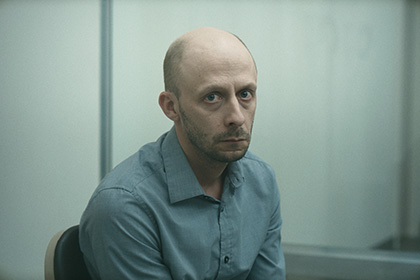
On the surface, this is a story about a horrific criminal trial - the details of which should disturb any reasonable person. But it’s a story about availability and exchange of information - the total and complete lack of privacy that we are aware of, accept, and even invite through our use of in-home cameras and virtual assistants with microphones regularly listening. It’s about our complete numbness to the number of times our personal information has been stolen by hackers and made publicly available to those with bad intentions. It’s a story about degrees of cruelty and depravity - ethical boundaries becoming less visible due to a level of access that people have never had before.
Vincent Biron’s cinematography is enthusiastically creative. Courtroom tracking shots that tell complete stories in one scene, drifting more to where one’s eye might go than where a camera traditionally would be pointed. Daring zooms that risk seeming ironic, but in their earnest usage are honestly dramatic and effective. Frames with backgrounds that are regularly as interesting and engaging as the foregrounds. The filmmaking is as focused on keeping your brain turning as the script itself.
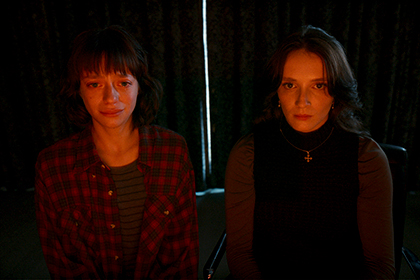
The score was composed by Dominique Plante – brother to director Pascal Plante. Dominique’s score immerses us in Kelly-Anne’s world. The music we hear often seems entirely motivated by Kelly-Anne’s inner workings. At one point, when the score audibly screams at you, it’s definitely Kelly-Anne’s scream - and you’ll feel it. The score fits at all times, leading us to where the scene will eventually take us, like something we might hear coming from beyond a corner we have not yet turned.
My recommendation is that you watch this movie with a cup of coffee by your side. The more questions you ask, the more you can appreciate what Pascal Plante has created in Red Rooms. Every piece of the filmmaking puzzle had to click perfectly into place for this movie to work. And thanks to some meticulous writing, producing, directing, and experienced, finely-tuned creative and technical skills, they all did.
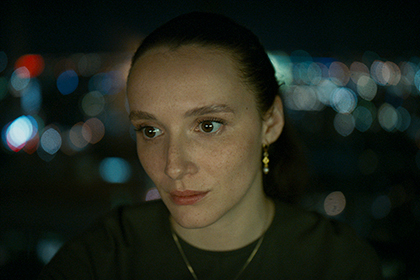
Aaron Barrocas is an award-winning screenwriter, filmmaker, and editor living in Los Angeles. He has spent the past 25 years as an active part of the entertainment industry. AaronBarrocas.com.